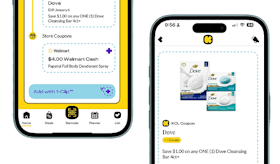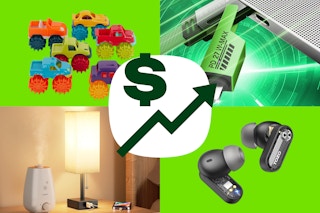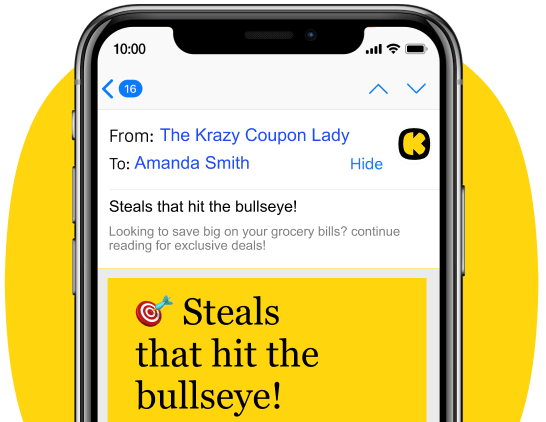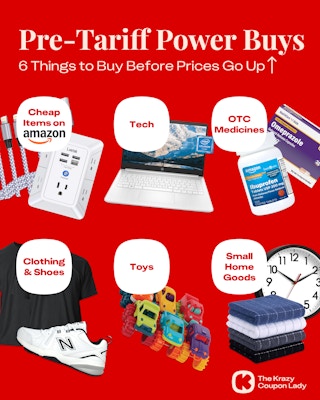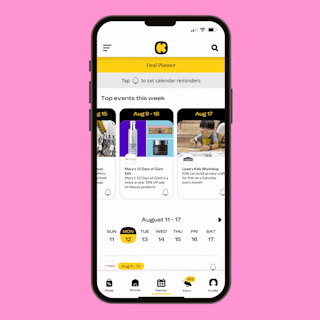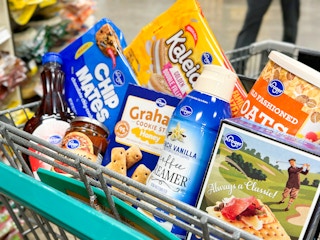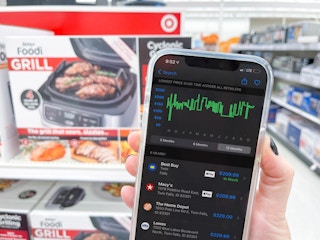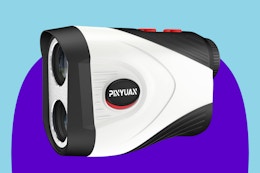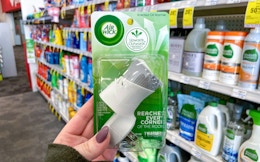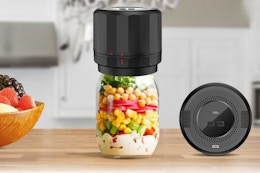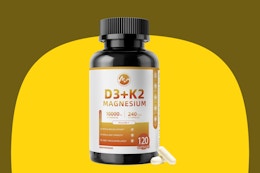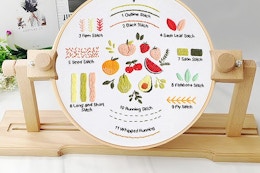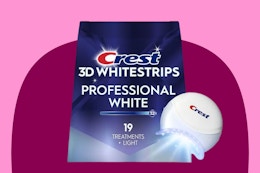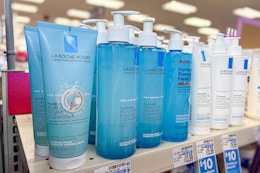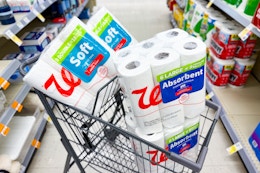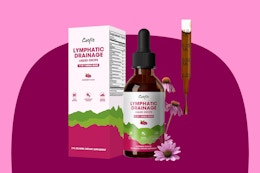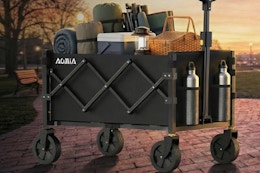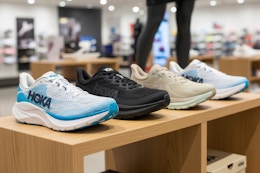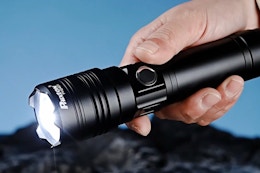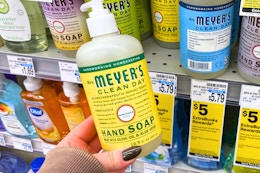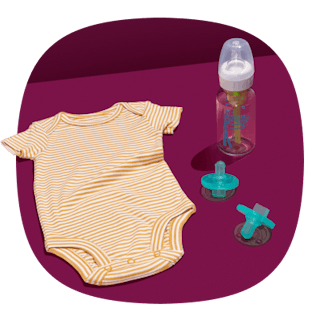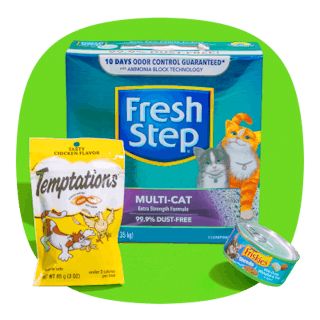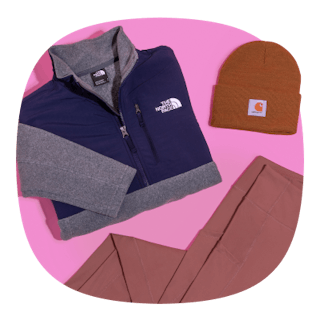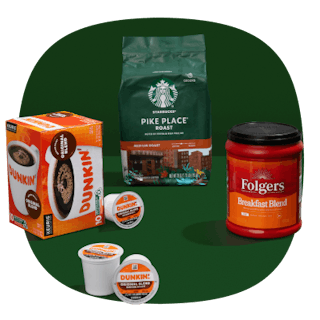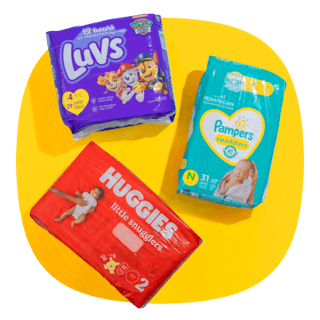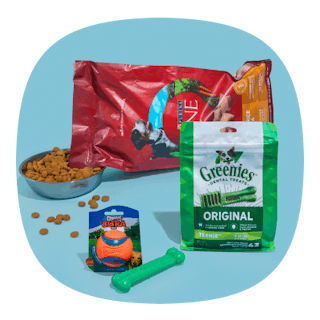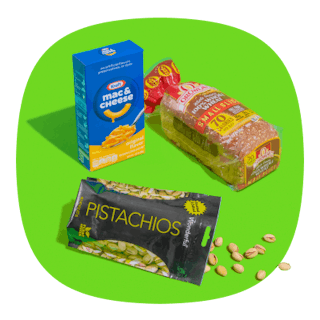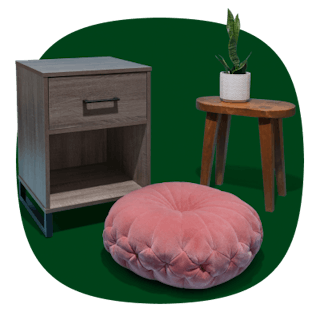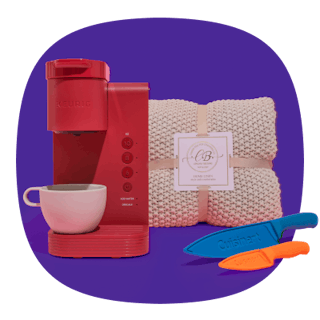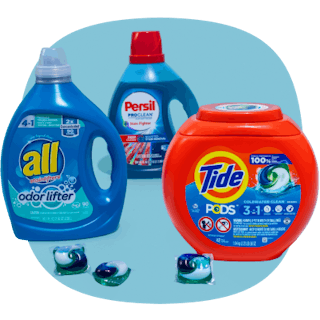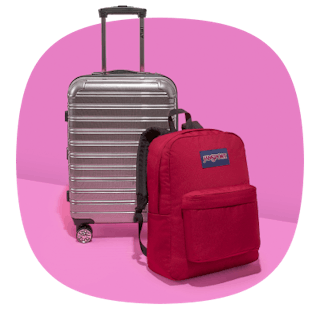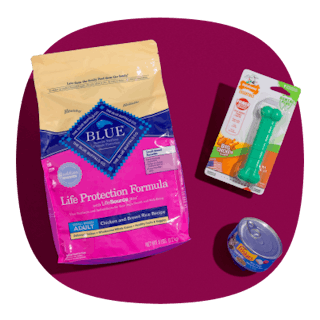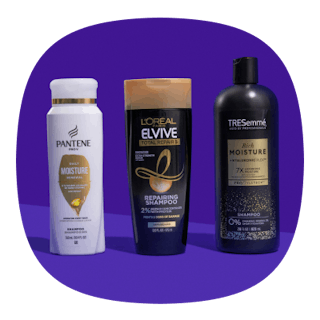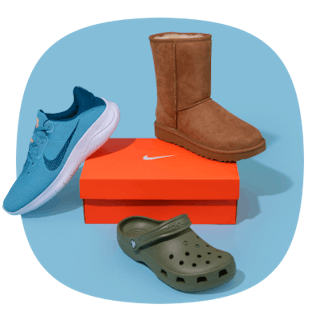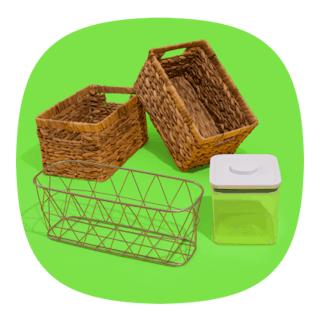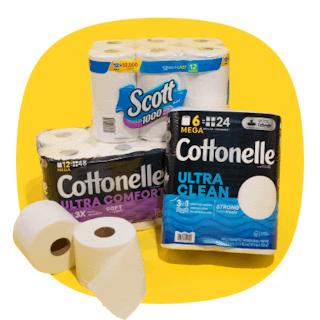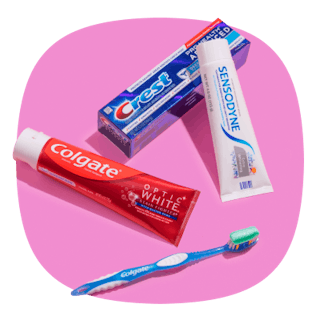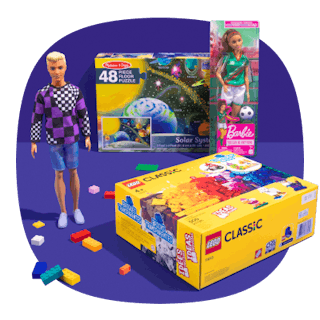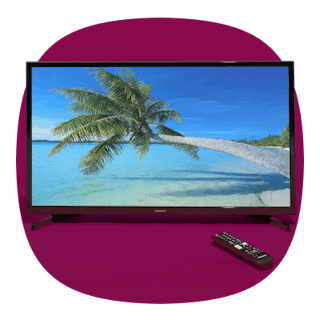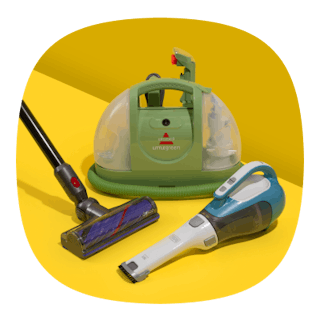With all the talk about tariffs, you might be wondering what everyday essentials or (already) high-priced items will be the most affected. Although Canada and Mexico tariffs have been delayed by a month as of Feb. 3, the 10% tariff on products made in China are already in effect (although the administration has walked back some of the tariff requirements on super-cheap goods from the likes of Temu, Shein, and Amazon Haul). And more 25% tariffs are reportedly coming on steel and aluminum.
So what does all this mean for the stuff you buy every day? To help you save the most despite the higher costs of the tariffs, we've rounded up some of the top products that are at risk of price jumps as a direct result. We'll keep this post updated, so be sure to check back often for the latest deals.
Download The Krazy Coupon Lady app for the more money-saving tips, deals, and coupons.
Tariffs raise the prices shoppers pay at checkout, but just how much more you'll pay is hard to predict.
The 2025 tariffs on Chinese goods are 10% across the board, but that doesn't mean you'll pay 10% more.
Tariffs are paid by those who import goods. Think retailers and brands you shop every day, as well as manufacturers that import materials to put them together on U.S. soil. It's up to them how much of that tariff cost gets passed on to shoppers like you, and they may try to absorb at least some of it rather than pass the full amount. But some of that amount will get passed on, turning into a higher price tag at checkout.
"They will try to reduce costs in their supply chain and wider operations, they will absorb some of the cost, and they will pass some across to consumers," says Neil Saunders, managing director, retail, at GlobalData (an analytics company that helps businesses navigate changes in their industries — like tariffs, for example). "Quite how this balances out remains to be seen."
Even products that are assembled in the United States might have parts and components from China. So you might feel the pinch, even if the end product isn't shipped from China.
"So much of our supply chain is interlinked globally," explains Rebecca Neumann, professor of economics at the University of Wisconsin-Milwaukee. "So it’s not just the goods made in China. Yes, if it’s made in China, it will get more expensive. But it’s also the other things, where imported goods are input into some other product we’re purchasing."
You might want to buy some big-ticket items now and stock up on essentials.
In short, a wide range of stuff is about to get more expensive. But here's the good news: You might have some time to get lower prices now, because companies have been prepping for tariffs.
"You might get some good deals if you shop right now," Edward Anderson, professor of information, risk, and operations management at the University of Texas at Austin, tells The Krazy Coupon Lady. "A lot of companies that get Chinese goods started stockpiling. They’ve been increasing shipments from China for the last month or so."
So while it's hard to pinpoint exactly which price tags will be affected and when, shoppers might consider buying some things sooner rather than later. "The advice would be to make big-ticket purchases now if you can and to perhaps stock up on some non-consumable essentials," Saunders adds. "We might be entering an unstable period for prices."
Neumann recommends focusing on specialty products that you're not willing to find a cheaper version of.
"If there’s a specialty product you really like, that might be the thing to get now," she says. "There may be other alternatives for basic goods. But if you like something specific, that might be the thing to get or stock up on.
Whatever you do, don't panic buy. And be sure to prioritize needs over wants. But if you're looking for products to look for deals on now, before tariffs start raising sticker prices noticeably, these are some categories that will be hit the most by tariffs.
Here are the items that may be more expensive after tariffs:
Cheap Stuff (Especially Cheap Stuff on Amazon)
Amazon's marketplace is dominated by third-party sellers that import from China.
"The vast majority of stuff on the Amazon marketplace is from China," Anderson says. "A lot of the cheap stuff is made in China by Chinese firms that don’t make much profit. So they’re being hit with a tariff. But also they make so little money, maybe a couple percent profit on their product, so they can’t absorb that 10%."
Small-ticket home decor that's manufactured in China will also likely see increases. Think stuff like cheap clocks, plastic decor, tablecloths, some linens, and towels, Anderson says. However, plenty of those things are also imported from counties other than China, meaning they won't get hit with tariffs. You also won't see increases on heavy, wooden home goods (which are more likely to be made in the U.S.).
In other words, prep for higher price tags on small-ticket goods. We find the best deals on Amazon under $5 daily, so consider checking to see if there's anything worth stocking up on.
Toys
Inexpensive toys, Anderson says, are very likely to get hit with tariffs.
"They’re often completely made in China, and what they get sold for is maybe a couple percentage points higher than what it costs to make and ship them," Anderson says.
Those razor-thin margins means that companies won't be able to absorb a 10% tariff, and will therefore increase prices. So consider buying your holiday toys early. While you've missed the boat on holiday toy clearance sales, we tend to see toy deals during Amazon Prime Day.
Tech Products (Laptops, Tablets, Phones, and Accessories)
Electronics "rely on components and manufacturing from a lot of different counties," so they'll be "heavily impacted" by tariffs, Saunders says.
According to Anderson, the impact of tariffs will be higher on certain tech. Higher-end electronics are more likely to be made in places other than China, or the company might absorb the cost (having higher prices to begin with gives them more wiggle room).
"On the other hand, if you’re getting a lower-end phone, like a burner phone, or something cheap that just needs to function, that's more likely to be made in China," Anderson says. "And the mid-range electronics could be affected because there’s a lot of assembly done in China currently."
If you need any tech items now or will need them in the near future (maybe you have kids heading off to college this coming fall), you might want to buy them now.
Apple Products
The good news, according to Anderson, is that shoppers might not get as much sticker shock from increased Apple prices (not more than they already do, anyway). That's because Apple is moving their assembly away from China, "as we speak," he says.
"Short-run, I think Apple will just absorb it," Anderson says. "And longer-run they won’t be in China any more."
Still, Apple discounts aren't something you find every day. When Apple tablets, iPads, or AirPods do go on sale, it's time to buy.
TVs
As with other tech, how much of a pinch you'll feel from tariffs depends on what kind of set you're shopping for. According to Anderson, there are super-cheap TVs on the market from China that will get slapped full force with tariffs.
But "the higher-end and medium-priced TVs won’t be affected as much," he says, because they're more likely to be from Korea, Japan, or the U.S.
Even TVs manufactured outside China may have components from China. So prices could go up a bit.
Vacuums
Whether you're looking for a brand name vacuum like Eureka or Roomba or a knock-off brand vacuum, here's your chance to buy one before tariffs hike the prices of their components.
Over-the-Counter and Generic Medicines
According to Anderson, if you buy generic versions of brand-name medicines, look for prices to spike. That's because, in some cases, the chemicals that go into the drugs, or even the pills and liquids themselves, come from China. "So if you go to Walmart and you buy an alternative to, say, a brand name like Zyrtec, that price going to go up," he says. "Stuff you get from the pharmacist will also be affected if it’s generic."
So consider buying now to stock up on OTC medicines you know you'll need. Target's weekly ad reliably has gift card offers for allergy medicines, cold medicines, and more. Plus, check out our guide for stacking coupons at CVS and our guide to couponing at Walgreens.
Clothing and Shoes
Brands like Nike, Adidas, and Gap rely on Chinese manufacturing for items such as cotton T-shirts, athletic shoes, and denim jeans. According to Saunders, "fast-moving sectors" (where there's a high turnover of inventory) are where shoppers will feel tariff impacts the soonest. And fashion is a fast-moving sector. So consider acting now if you're in need of new shoes and basics for the family.
That said, the impact on clothing "may not be as bad as expected," Anderson says, because a lot of inexpensive clothing is currently manufactured in Vietnam and Bangladesh. It all depends on where it's coming from.
Small-Ticket, Very Cheap Products From Shein, Temu, and Amazon Haul (Price Increases Could Be Coming Soon)
There's been some back-and-forth here. In early February, the U.S. suddenly ended what's called the "de minimis" exemption for products shipped from China. The de minimis exemption allows cheap products (in packages of under $800) from the likes of Temu, Shein, and Amazon Haul to ship to U.S. customers duty- and inspection-free. Ending it means it becomes way more expensive (and more of a headache) for those companies to do business in the U.S.
But then the administration walked things back on Feb. 6, announcing it would delay the end of the de minimis exemption until it figures out how to enforce it. So, those super-cheap products can flow in for now like they used to, but price increases are still on the horizon if and when the de mimimis exemption ends permanently.
Because those products are so cheap to begin with, the price increase will be small too. "Players like Shein and Temu will still be comparatively cheap, and they won’t disappear," Saunders stays. "It’s just that prices may not be quite as cheap as they once were."
Even so, if you need to stock up on party supplies, decor, and whatever you like to buy from these sites, consider shopping soon and taking advantage of, for example, Amazon Haul's offers for 10% off discounts when you spend $75 or more.
Smart Shopping Strategies for a Post-Tariff World
Shopping in a higher-price world requires deal-hunting skills. And that extra time, Neumann says, is one of the biggest unrecognized costs of tariffs, because, at the end of the day, your time is money. She calls it the "search cost."
"You’re having to look for alternative products that serve a similar function," she says. "And that does increase that search cost of finding better deals. Do you go to multiple stores? You have to factor that in on top of what the price of the item is."
To save you at least some of that "search cost," here are our most effective methods for hunting deals in a post-tariff world.
Use KCL's tools to make couponing power moves.
While you may be paying more than you want to, you should never pay more than you have to. KCL has resources and tools for beginner and pro-level couponers alike:
-
Our free KCL app: Shopping when things are on sale or when there's a good coupon is a way to bring down those tariff price hikes. Our app lets you set up alerts for the stuff you want deals on and find coupons for the stores you want to shop. Also, did you know the KCL app has a free Deal Planner feature? Deal Planner lets you sign up alerts for sales you want to shop so you don't forget. Tap the calendar icon at the bottom of your screen to get started.
-
KCL's Couponing for Beginners guide: Think of it as your starter pack for couponing. It takes you through everything from where to find digital coupons to the best stores to grow your couponing skills.
-
Text alerts: If you're too busy to hunt for deals or even check an app, just text DEALS to 57299, and we'll send you the best savings we find, straight to your phone.
Maximize your savings with loyalty programs, rebates, and rewards.
Now's not the time to leave any savings on the table. In addition to using coupons and shopping sales, make sure you're using at least one of the following:
-
Cash-back rebate apps (like Ibotta, Fetch, and CoinOut): These free apps let you send in your receipts and get cash-back rewards that you can redeem for for gift cards and, in some cases, transfer to Venmo. These apps are important for your post-tariff shopping strategy because some things might be tough to find good discounts on going forward. By using these apps to get a kickback on stuff you need, you can redeem for a gift card later to get a big-ticket item that's now more expensive.
-
Retailer loyalty programs: If you shop somewhere regularly, sign up for the retailer's loyalty program or get their app. Walgreens Cash Rewards, Kroger Cash Back, and Target Circle, for example, all let you earn rewards on your purchases that you can redeem for future purchases. You won't always find offers on stuff that's affected by tariffs, but you can redeem your rewards on things that are.
-
Rewards credit cards: Assuming you can pay off your balance on time every month (to avoid paying high interest rates), rewards credit cards can help you get a little back in rewards for your purchases. Even if you have to pay more than you'd like for a big-ticket purchase, you'll earn rewards back. If you don't want to open another credit card, consider the Target Circle debit card (no credit check necessary). It'll earn you 5% back on most of your Target purchases, which you can redeem for future purchases.
Look for generic alternatives.
While tariffs aren't set to affect grocery and food prices (unless you're shopping imported Asian food brands from China), saving on groceries you buy every week by going for the generic version can free up your budget to buy things affected by tariffs.
So now's the time to start working more store brands into your shopping list. Here are a few generic items we found at Aldi, Walmart, and more that we think are just as good as their brand-name equivalents. Amazon even has a deeply discounted in-house brand for key staples.
Buy refurbished tech at up to 50% off full price.
Tariffs are charged only when an item is imported. So buying refurbished and used electronics is a way to get the same thing without paying tariff markups.
Amazon, Best Buy, and Apple sell refurbished and open-box tech at a discount. In addition to paying less, you get to shop knowing you're covered by these stores' return policies. Amazon Resale, for example, offers brands like Shark, Bissell, Keurig, Apple, and more for up to 50% off.
Embrace weekly ads and weekly coupons.
Deciding what to buy based on what's on sale is the foundation of any solid savings strategy. And weekly ads are where you'll find what's on sale.
Target's weekly ad, for example, often offers deals on things affected by the tariffs, including electronics and clothing. It also often has gift card deals, where you get a free Target gift card if you spend a certain amount. That means you can stock up on what you need and then turn the gift card around to lower the price of something that's been affected by tariffs.
Another reliable weekly deal is the Dollar General's $5 off $25 coupon, which you can use on Saturdays. You can also use it in combo with other Dollar General coupons, as long as your cart total after discounts is $25 or more.
Use price tracking and comparison tools.
This one's more of a pro-level hack, but with practice, it'll become part of your shopping strategy. Tariffs aside, retailers compete with each other. So it's worth checking whether something you're eyeing at, say, Target, is cheaper at Walmart, or vice-versa.
And that's where comparison tools and apps come in (check out our favorites). For example, the ShopSavvy app lets you scan an item's barcode while you're shopping to see if another store has it for less.
Price alert and tracking apps are also handy tools. Keepa is an app and browser extension for Amazon that lets you set price alerts, so you know when the price on an item you're tracking falls. This is useful intel in a post-tariff world, because you'll likely need to price-stalk big-ticket items until they fall within your budget.
Related Reading:
Download the KCL app to add and redeem coupons in store
